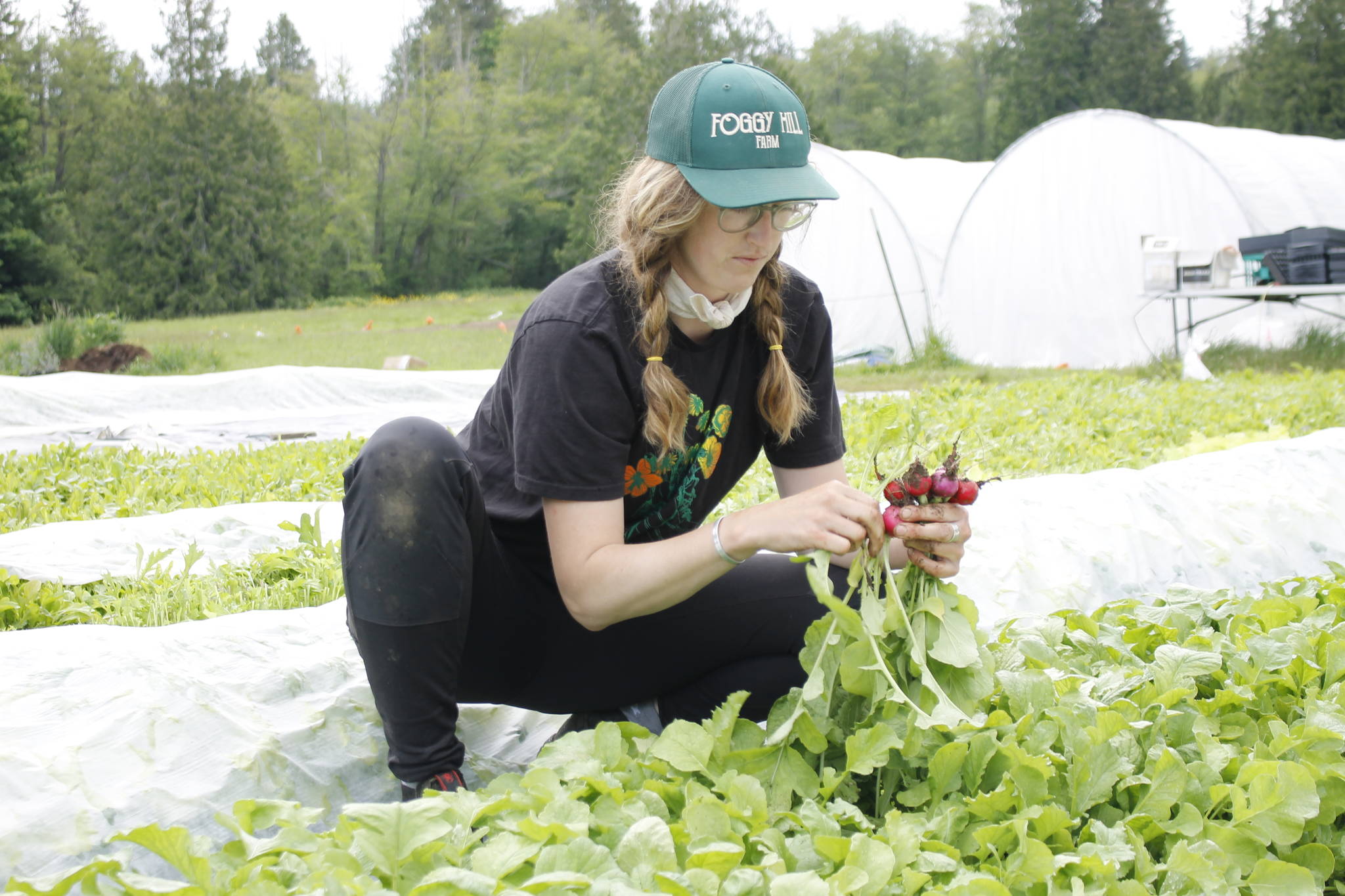Island dwellers who want to get a little more familiar with where their food comes from may want to consider signing up for a CSA, or Community Supported Agriculture, program at one of Whidbey’s farms.
According to The Modern Farmer magazine, the CSA model was developed in the 1960s and 70s by Booker T. Whatley, a Black horticulturist and agricultural professor. The advocate for regenerative agriculture encouraged “pick-your-own farms” and “clientele membership clubs” as a way to ensure capital for a farmer’s growing season.
Today, some of Whidbey’s farmers can agree on the importance of that upfront capital when it comes to the cost of getting things planted and fertilized. Being part of a CSA program also serves as a direct connection between a community member and the farmer.
The following includes a taste of a few farms that still have spaces available in their summer CSA programs.
Foggy Hill Farm
Vegetables and flowers abound at Foggy Hill Farm, a one-woman farm located adjacent to an animal sanctuary.
The half-acre farm is run solely by Alanah Lawrason, a young farmer who began the venture just last year.
Foggy Hill Farm had a popular fall CSA program. This summer, community members will be able to join a vegetable or flower CSA, or a mix of both.
For a period of 20 weeks from June 2 to Oct. 13, the vegetable CSA is priced at $600. The deadline to sign up is June 1. Vegetables such as tomatoes, peppers and cucumbers will be available, with recipes included in the box.
The flower CSA is priced at $180, starts at a later date and only runs 12 weeks. Flowers, such as sunflowers, snapdragons and tuberoses, will be available. The deadline to sign up is June 14. Members will get a bouquet of flowers each week.
The combined veggies and flowers CSA is $735 for the season.
CSA boxes can be picked up at Foggy Hill Farm.
Lawrason is hopeful she might be able to interact more with shareholders this year. Last year was tricky to hold farm tours with the pandemic happening.
“This year, I’m kind of hoping that they can come on the farm a little bit more and see it,” she said.
If there’s one positive thing that came out of the pandemic, she thinks it would be the rise in demand for local food.
“I think people really want to eat locally and they really want to support the farmer that way,” she said of CSA programs.
Skyroot Farm
CSA sign-ups are still available at Skyroot Farm, a 20-acre certified organic operation. The 19-week season begins June 16 and runs through Oct. 20.
The cost for the season is $532. Each box contains eight to 10 seasonal produce items, a mix of salad greens, root crops, herbs, fruits and a newsletter subscription including stories from the farm, recipe suggestions and poetry.
CSA members also get first dibs on farm favorites, such as sweet corn and melons.
Boxes are available for pick-up Wednesdays at the farm in Clinton or at a downtown location in Freeland.
“We practice farming using a ‘no till’ approach to maximize carbon storage in our system’s soils and to build a healthy microbial community in the soil,” said Eli Wheat, owner of the farm and an environmental studies instructor at the University of Washington.
“We are incorporating livestock and orchards into our production to build a regenerative farm,” Wheat said.
Organic Farm School
Other farms have opted for a slightly altered CSA program. The Organic Farm School is using a “flex” CSA model that will allow shareholders to choose how much they want to spend throughout the season.
This means shareholders are not committing to a set box of produce each week.
Instead, the Organic Farm School holds their credit kind of like a gift card, allowing members to order from a weekly availability list — whatever they want, how much they want and nothing they don’t want, according to Executive Director Judy Feldman.
At any time, funds can be added to a person’s account balance for the flex CSA.
The program runs from April to November, but due to its flexible nature, it’s never too late to sign up for it.
Orders can be placed without a CSA subscription at localline.ca/organic-farm-school.
Pick-up time is 1-4:30 p.m. on Wednesdays.
Feldman explained that with the flex program, the Organic Farm School is only harvesting what people order.
“This allows us to minimize waste and keep our quality high even as we diversify our markets,” she said. “Also, it runs for the course of a season.”
Full Cycle Farm
Similar to the Organic Farm School, Full Cycle Farm is following a CSA model with some modifications.
Members are still being accepted for this year and there is no deadline to sign up by.
Shareholders can order a small CSA bag costing $15 or a large bag costing $25 on a weekly basis. The farmer will choose what is best that week.
Alternatively, the farm also has an online “fresh sheet,” where members can order exactly what they want each week.
“There is no minimum or maximum, just that people order at least once a month to stay on the fresh sheet,” said farm owner Eric Conn.
In addition to vegetables, the family-owned farm also offers flowers, fruits, herbs and starter plants, as well as wreaths in November and December.
Items are harvested fresh for a midweek pickup, direct from the farm.



